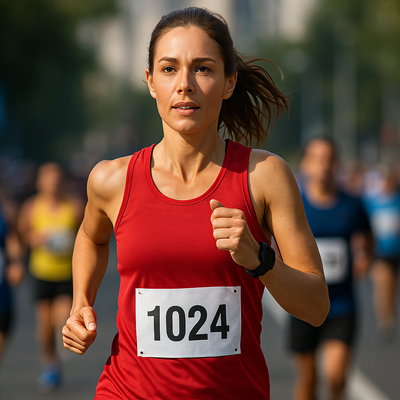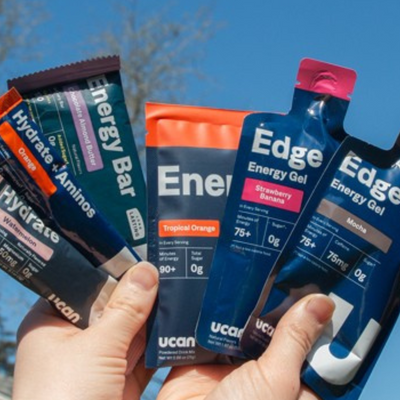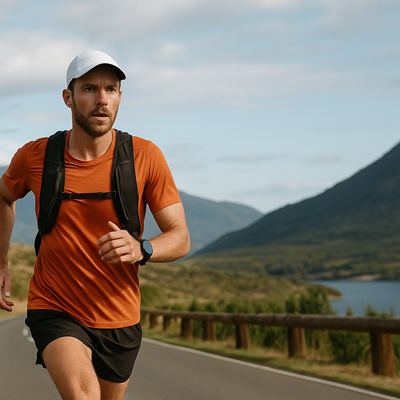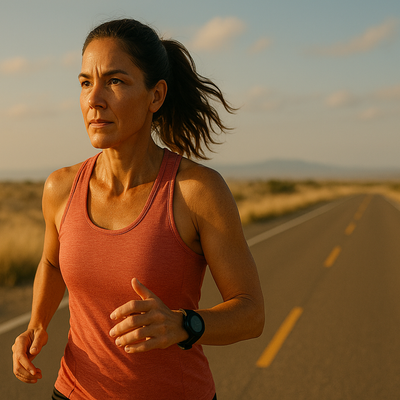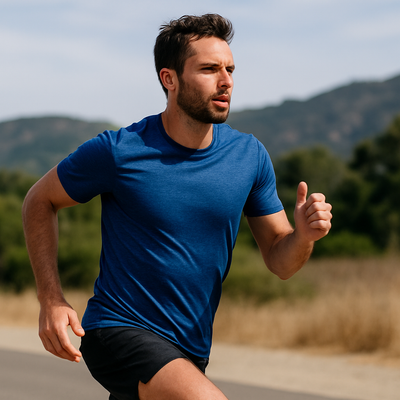The world demands a lot of you every day: work, exercise, chores, managing stress, and taking care of yourself and loved ones. The rigors of this routine can leave you depleted and feeling like you’re never operating on a full tank. However, your energy level is also directly tied to your overall health.
“You may feel fatigued because of a lack of sleep, too little or too much physical activity, poor dietary choices, or feeling stressed for a prolonged period of time,” says Cathy Yeckel, Ph.D., an assistant clinical professor at Yale School of Public Health who specializes in human metabolism and nutrition. Taking a proactive approach to your health can improve your energy levels and allow you to live a more productive life without being limited by fatigue.
Redefining Energy
We typically think of energy as a rapid delivery of sugar or caffeine. But if you rely on coffee, a sugary energy drink, or a sugary snack to offset an afternoon lull or prepare for a workout, you could end up feeling more fatigued than you did before, as these are quick fixes that can backfire. Instead, focus on natural ways to boost energy. That starts with improving the quality of your overall nutrition.- “Your body is at the mercy of what you eat,” explains Yeckel. “After consuming simple ‘quick’ carbs like sugar, your blood glucose can swing wildly up and down. When you’re eating complex carbs, which are slower to process and absorb, your blood glucose can swing gently.”
The Role of Glucose
The truth is, lack of energy is rarely due to any one factor but is likely a combination of variables. Addressing all of them is the most effective way to make a difference, but a clear understanding of the ebb and flow of blood glucose is key.
Glucose is the body’s primary source of energy for everyday living. When you consume carbohydrates, they are broken down into glucose that enters the bloodstream, which your body either stores or uses. Your muscles store some of it as glycogen, a supply of “fuel on demand” for exercise. Glycogen is also stored in the liver, which releases glucose as needed to keep your energy stable.
However, when you consume too many simple carbs, whether in foods or energy drinks, your blood sugar level surges quickly. Your body has more glucose than it can handle, so your pancreas produces an increased amount of insulin to help move it into your cells—but then your blood glucose plummets, leading to sudden fatigue.
We’ve all been there: You eat a big bowl of pasta at lunch or a piece of cake, and soon you feel distracted, unproductive, and lethargic. Or you’re in the middle of an endurance race and you “hit the wall.” “Nutritional strategies that minimize large swings in blood glucose and instead emphasize steady blood glucose energy appear to have benefits in everyday life for a wide range of people,” Yeckel says.
The Best Carbohydrate Sources
Still, carbs are a vital source of energy for both workouts and everyday living, but you need to choose the right kind. There are three types of carbohydrates: sugar, starch, and fiber. Sugar is a simple carbohydrate, while starch and fiber are complex carbs.- Simple carbs include baked goods, fruit juice concentrate, candy, syrups, and foods that are processed or refined.
- Complex carbs are typically richer in vitamins and minerals and include fruits, vegetables, nuts, beans, and whole grains.
Simple carbs are absorbed more quickly and cause blood sugar spikes—short-lived bursts of energy that lead to energy crashes. Complex carbs are absorbed more slowly, help keep blood sugar steady, and promote more sustained energy. “Try to mimic the natural strategy of the liver and select carbs that release their glucose energy into the bloodstream more slowly,” Yeckel says. Choosing nutrient-dense complex carbs also leads to feeling fuller longer.
Some good go-to options include:
- grains like brown rice, quinoa (technically a seed), and oatmeal
- starchy vegetables like sweet potatoes and squash; beans and other legumes like chickpeas and lentils; and most other vegetables.
- “We love UCAN as a pre-workout base as well as during a workout,” says Julie Burns, integrative sports nutritionist, registered dietitian, and team nutritionist for the Chicago Blackhawks. “It keeps you going without the highs and lows, which helps to preserve metabolic health.”
Healthy eating also includes matching your carb intake to your activity level and goals and choosing an abundant and colorful array of vegetables and some whole fruits. Protein is also vital for muscle recovery and growth. To make sure you are getting adequate protein, multiply your weight in pounds by 0.36 or use a protein calculator to figure out your recommended amount. If you’re looking for a simple guide, aim to fill your plate with 50 percent vegetables and whole grains and 50 percent protein.
Go-to proteins include fish, poultry, lean beef, eggs, nuts, tofu, and legumes. Many animal protein sources like beef and chicken naturally include fat. Other healthy fats include nuts, nut butters, fish, and avocado.
The Power of Sleep
Adults need at least seven hours of sleep per night, but just because you’re in bed with your eyes closed doesn’t mean you’re getting quality rest. If you’re hitting the snooze button several times every morning, experiencing daytime sleepiness, or waking up during the night, you might need to develop better sleep habits.
Getting a good night’s sleep is critical for many reasons. Sleep is when your body adapts and recovers from stress, which makes it one of the most natural and vital energy boosters. Not getting enough quality sleep also disrupts your glucose metabolism and affects your appetite, Yeckel says. When you fall short of seven hours of shuteye, you’re more likely to be hungry, especially for sweet, high-carb snacks that give that quick jolt you’re seeking.
Researchers have also found that lack of sleep has been found to trigger cravings because of the increased levels of ghrelin and decreased levels of leptin, the appetite-regulating hormones that tell your brain whether you’re hungry or full.
- “People whose diets are full of healthy foods generally get better sleep quality and those with diets high in processed foods have poorer sleep quality,” Yeckel says. “Shifting your eating plan to favor healthier food choices may, in the long run, help break the cycle of poor sleep leading to unhealthy snacking behaviors.”
A good night’s sleep requires a little planning. It’s best to go to bed at the same time each night and get up at the same time each morning, even on the weekends. Make sure your bedroom is quiet, dark, and at a comfortably cool temperature. Keep TVs, computers, and smartphones out of your room or off, and avoid large meals, caffeine, and alcohol before bedtime.
Getting regular exercise during the day will also help you fall asleep more easily; as little as 30 minutes of moderate aerobic exercise daily can help increase the quality of your sleep, according to Johns Hopkins Medicine. Although researchers aren’t exactly sure how exercise affects sleep, being active causes your body to release endorphins, feel-good chemicals that relieve stress and anxiety that can keep you awake, and it can also reduce the time it takes to fall asleep.
The ideal time to exercise is whenever you can fit it in, though that’s it’s better to avoid intense activity within three hours of bedtime; this can have the opposite effect because the same endorphins can stimulate the brain and exercise raises core body temperature, both of which can inhibit rest.
You can try some natural sleep aids as well: Burns recommends tart cherry juice, which has been shown to increase sleep duration as well as magnesium supplements, both of which can help lower stress-hormones like cortisol and lead to better shuteye, she explains. Tart cherry juice has a small amount of melatonin—a hormone that helps regulate the body’s circadian rhythms—and tryptophan, an amino acid used by the body to produce melatonin.
For individuals who wake up hungry in the middle of the night, she recommends UCAN Protein + Energy or a UCAN Energy Bar before bed to help keep blood sugar steady at night and prevent sleep awakenings.
The Importance of Stress Management
Chronic stress is an energy zapper. When you’re experiencing stress, your adrenal glands release hormones like cortisol, which activate the fight-or-flight response. This increases blood pressure, heart and respiratory rate as well as changes in appetite. Cortisol also increases glucose in your bloodstream, according to the Mayo Clinic.In fact, the American Psychological Association (APA) has found that the effects stress can have on the body are numerous, including changes in gut bacteria, which influence brain function, mood, and emotions.
In times of acute stress, you may lose your appetite because stress hormones put hunger on hold. During chronic stress, however, prolonged elevated cortisol levels can increase your appetite and lead you to reach for comfort food that’s high in fat or sugar but doesn't provide sustained energy.
- “Addressing stress will modulate blood sugar,” Burns says. “The right foods and lifestyle help balance cortisol levels and break the cycle.” She recommends eating foods that contain magnesium, such as almonds and pumpkin seeds as well as green tea sweetened with monk fruit, which contains no calories.
The Hydration Equation
Drinking enough water throughout the day is a more important source of energy than most people realize. Having a glass of water when you first wake up is a great way to kick-start the day. Fluids help deliver nutrients and oxygen to your cells, protect tissues and the body’s organs, and are essential for digestion, circulation, eliminating waste, and maintaining body temperature. Fatigue is one of the key symptoms of dehydration and, according to the Cleveland Clinic, not getting adequate fluids can leave you feeling confused, cranky, and anxious. The National Academies of Sciences, Engineering, and Medicine recommends that men get approximately 3.7 liters of water each day and women get approximately 2.7 liters, but how much you should drink depends on your size and activity levels, too. And water doesn’t all have to come from a bottle—vegetables and other fluids like tea, coffee, and milk also count.- “Staying consistently hydrated is critical for energy,” Burns says. “It’s especially important for athletes who are training hard in endurance sports. Losing just 2 percent of your body weight loss in water during training or an event can lead to decreased performance and cognition.”
More Ways to Get a Quick Energy Boost
You’ll still need a quick boost of energy sometimes. That’s when you’re likely to turn to caffeine or certain energy drinks to pull you through. These don’t technically boost energy levels either—some may just be blocking your fatigue with stimulants, which also increase your heart rate. Fortunately, there are more effective ways to get a natural pick-me-up.
An outdoor walk
Get up from your desk and away from the screen for a short walk outside; the sunlight and vitamin D can also help energize you. A study in the journal Fatigue: Biomedicine, Health & Behavior found that low-to-moderate-intensity exercise after 20 minutes or more decreases fatigue, while another study at the University of Georgia showed that 10 minutes of low-to-moderate-intensity stair walking gave participants more energy than 50 mg of caffeine. There’s nothing like a change of scenery and some fresh air to get your blood flowing.
Deep breathing
A few minutes of breathing exercises, like box breathing (inhaling slowly for a count of four, holding your breath for a count of four, then slowly exhaling through your mouth for four more seconds) can clear your mind while it calms your respiratory and cardiovascular systems. To get your energy flowing again, Burns recommends the 4-7-8 technique (breathe in for four seconds, hold the breath for seven seconds, exhale for eight seconds). There are a variety of apps with guided deep breathing that you can find on your smartphone.
A quick snack nap
You may have heard about coffee naps (drinking coffee before a short nap), but what about snack naps? If you can rest for 10 minutes and then eat a small, energy-boosting snack, it’s a good way to get more energy to power through the rest of your day. Don’t sleep too long, though—studies show that a 30-minute nap may result in lingering drowsiness—and make sure the snack isn’t high in sugar. When you wake up, a low-sugar UCAN Energy Bar can help you get going again and provide a sustained energy boost. “These are both great smart carb choices to keep energy stable over time,” says Yeckel.
Peppermint or green tea
Some teas can boost energy levels without any (or little) caffeine. Peppermint tea, for example, may perk you up—the compounds in peppermint have shown to reduce mental fatigue, according to one study. Green tea, which contains only a small amount of caffeine, when combined with a healthy, blood-sugar-stabilizing snack, helps promote calm as well as balanced cortisol levels without causing blood sugar fluctuations,” Burns says. Try one of these simple moves the next time your energy is lagging to perk you up without the crash of a sugary snack or a caffeine-laden beverage.



